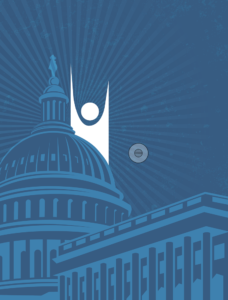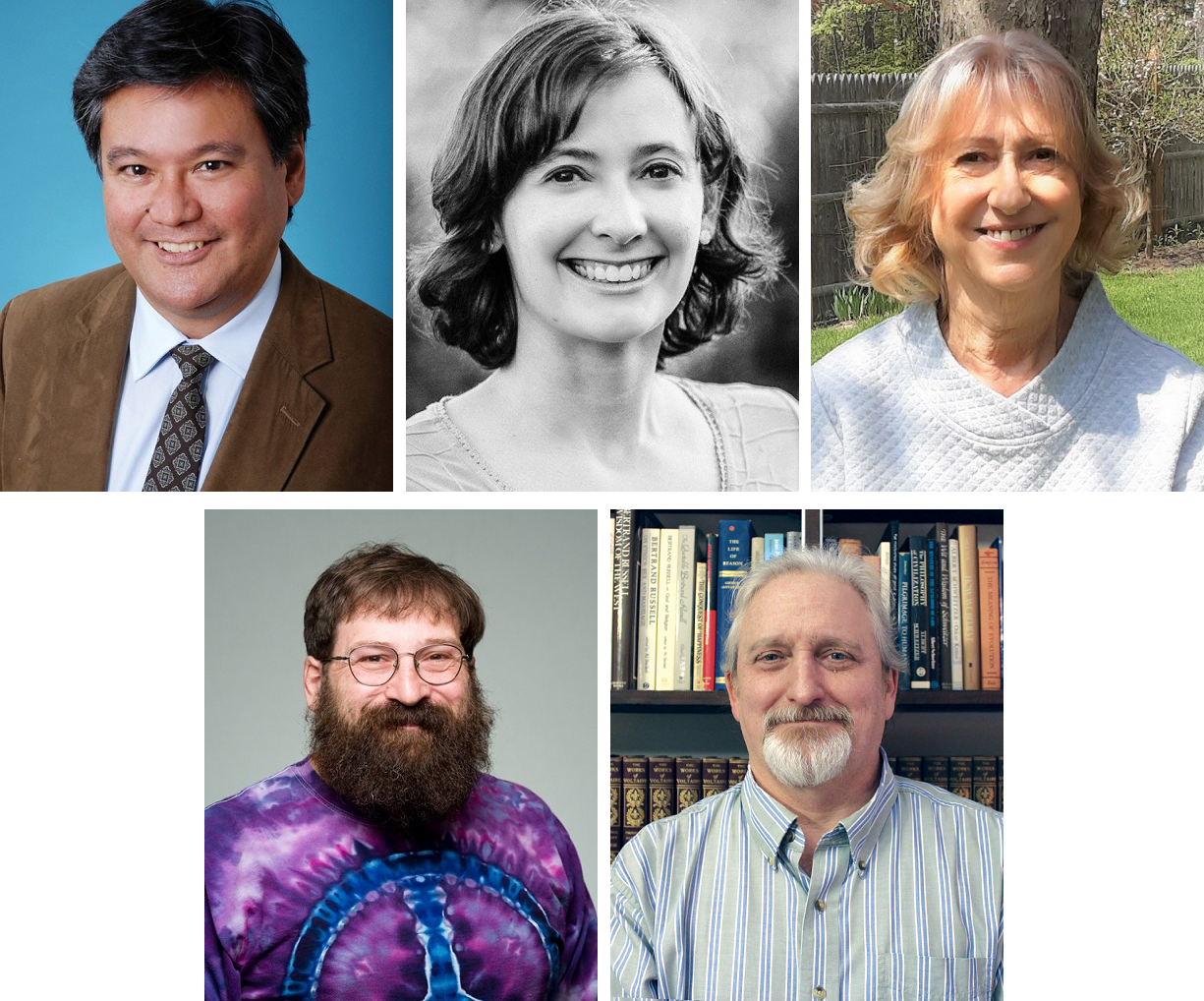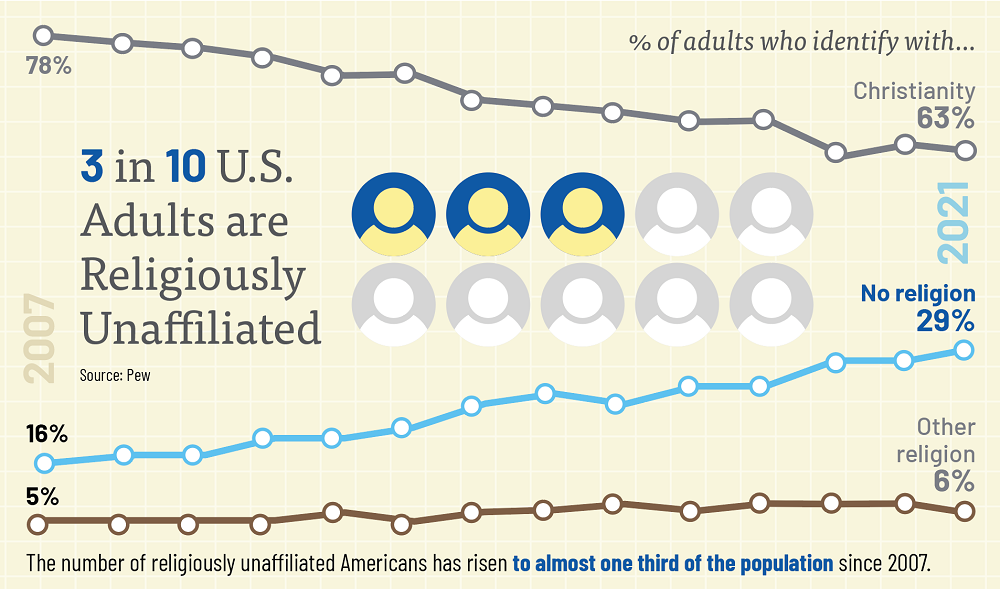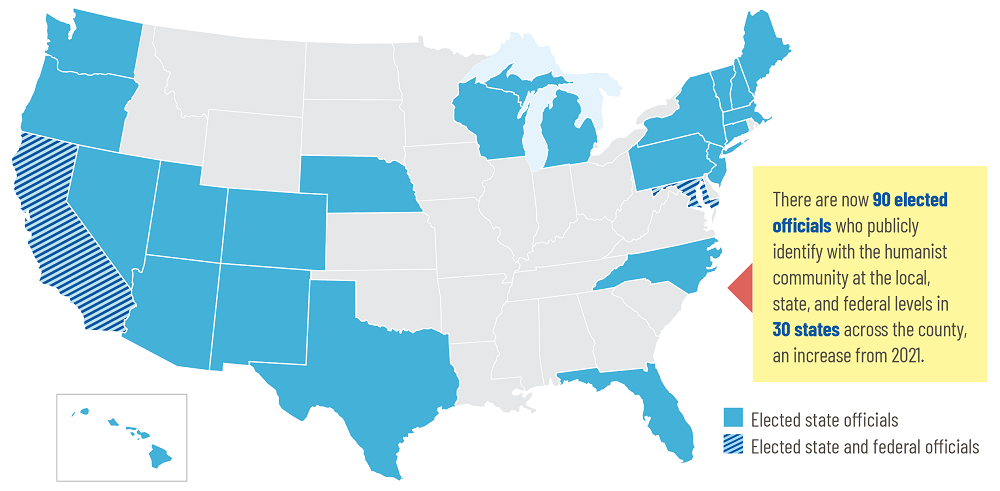Representation Matters: Political Participation and Empowerment

This article is adapted from a panel discussion hosted at the 81st Annual Conference of the American Humanist Association in July 2022. Ron Millar, Political and PAC Coordinator at the Center for Freethought Equality (an affiliate of the American Humanist Association), moderated a panel discussion with the board members of the Association of Secular Elected Officials.
Board members from the Association of Secular Elected Officials (ASEO):

Top row, left to right: Danny Choriki, Billings, MT City Council; Kristiana de Leon, Black Diamond, WA City Council; Sherry Dutzy, NH House of Representatives.
Bottom row, left to right: Leonard Presberg, Fayette County, GA Board of Education; Moderator: Ron Millar, Political and PAC Manager, Center for Freethought Equality
Ron Millar: This panel is going to discuss the need and ways for members of the secular community to be more engaged in the political and electoral process. The need, as demonstrated in the last few years from the January 6th attempted coup to the recent anti-abortion ruling from the Supreme Court, is self-evident, so we’re going to focus on the means of political empowerment, but I do want to mention the need for us to be involved politically. Our community is growing very rapidly, but this increase in numbers is going to be meaningless unless we are engaged in the political and electoral arena. We will have the power to build the society we want to live in. We can create a strong, pluralist democracy that bases public policy on compassion and reason. We also have the clout and the numbers to counter White Christian Nationalism. The goal is to end their anti-democratic, bigoted, anti-science, racist, misogynistic, xenophobic, homophobic crusade. If we want to do those things, we have to be active. It’s not just about demographics. We have to step up.
I’m Ron Millar. I work with the Center for Freethought Equality (CFE), the advocacy and political arm of the American Humanist Association (AHA). CFE was instrumental in encouraging Jared Huffman, a member of Congress, to publicly identify with our community—only the second Member of Congress to ever do so. We also helped him create the Congressional Freethought Caucus, which is an important caucus within Congress that works on behalf of the atheist and humanist community, works for that secular nation that we’re trying to build and for public policy based on evidence and reason.
The AHA is affiliated with the Center for Freethought Equality because, as a 501(c)3 non-profit, the AHA is limited in the amount of lobbying it can do. It is also prohibited from endorsing or appearing to endorse a political candidate or even a political party. The Center for Freethought Equality, on the other hand, is a 501(c)4 organization. CFE can lobby all day long and can also be actively engaged in the electoral arena. When I started with CFE in 2016 we knew of five state legislators who identified with our community and now we’re up to sixty state legislators. It’s a nice increase. Unfortunately, we need another 1,500 to get parity with our population, so we have a lot to do.
One of today’s panelists, Leonard Presberg, contacted me a while ago and said, ”We have a critical mass of elected officials who identify with atheists and humanists community. Let’s start an Association of Secular Elected Officials.” I thought that was a brilliant idea, so the people who you’re going to hear from on this panel are all elected officials who identify with the humanist community and are on the board of the Association of Secular Elected Officials (ASEO): Danny Choriki, is on the Billings City Council in Montana; Kristiana de Leon, is on the Black Diamond City Council in the state of Washington; Sherry Dutzy, is a member of the New Hampshire House of Representatives; and Leonard Presberg, is on the Fayette County Board of Education in Georgia. Panelists, please introduce yourselves.

Leonard Presberg: I’ve served on the school board in Fayette County Georgia, which is just south of Atlanta, for about ten years. I worked with Ron to form the ASEO because of my experiences as a non-religious, humanist elected official. When I first came into this role, I had all sorts of feedback from the community. The local newspaper ran a huge editorial asking if I was morally fit to serve on our school board because I didn’t go to church with other community members. I’ve had people come to school board meetings and use their public comment time to pray on my behalf. So I wanted to join with other elected officials across the country to support each other and share education about policy areas where we increasingly see people’s individual, idiosyncratic religious beliefs becoming policy.
Danny Choriki: I was born and raised in Montana, spent most of my adult life living and working and learning and loving in New York City, and I came back to Montana about ten years ago to be with my parents and to fulfill a promise I made to myself about changing politics in Montana. I’m a trained environmental scientist. I’ve spent most of my life being involved in politics, in one way or another, going all the way back to 1968 when I was in sixth grade and I was so disgusted with what was going on in politics that I said I would vote for George Wallace. I know better now. I now am a very firm believer that we need to pay attention to what’s going on. Obviously what’s happened with recent Supreme Court decisions is a great example of that. I think we need to be thinking about the fact that we, as humanists, have dropped the ball in the cultural war that is going on right now. That is literally what’s going on: our culture is being changed to an authoritarian one and we need to step up and figure out how to turn that around. That’s my mission here in Montana.
Kristiana de Leon: I’ve served on the Black Diamond City Council since 2019. I decided I was going to realize my dream of serving my community. I cared about the increasing diversity in our community and wanted to make sure it was safe and welcoming. I cared about the environment. I soon discovered that I was running against a far-right militia leader and it’s been quite an interesting ride ever since. My city just recently celebrated its very first Pride event this month. It’s really a testament to what can happen when you elect folks who are interested in shared values of inclusion and diversity and having a welcoming community. It’s an example of why selecting elected officials is so critical. When I was running, this was not something that I thought could possibly happen during my first term in office, but here we are.
I have been excited to be part of the ASEO. It’s been one of the things that’s helped to fill my cup and find that sense of community, since I identify as a humanist and an atheist. I participated in the AHA’s Lobby Day this week and I highly encourage folks to get involved with that sort of event. It’s important to connect with your elected officials that way. As someone who is also an elected official, I can tell you that it means a lot to us when we have folks speaking up on behalf of our shared values.
“Every time I read about a humanist I’m so proud, because I think we’re excellent role models.” —Sherry Dutzy
Sherry Dutzy: I grew up outside of Detroit and came of age during the Vietnam War which inspired me to be involved politically. Like a lot of people, during my 30s, 40s, and 50s I was focused on a career and, although I was involved in politics, I couldn’t really engage in the political system, other than voting and supporting candidates. When I went into the post-career chapter of my life, I wanted to give back to my community and got involved with the National Conservation Commission. During that time things changed politically on the national level and a friend of mine and I decided that we wanted to get involved in the political arena. We didn’t like the way the country was going, so in 2017 we ran for the post of selectmen which, in my town of Nashua, is actually just a poll worker. It got me in the habit of knocking on doors, going door-to-door, and actually seeing what happens during an election, and how hard election workers work. Then, in 2018 when they couldn’t find candidates in my ward to fill out the ballot, I decided to throw my hat in the ring as a state representative. I won that election, was reelected in 2020, and now I’m up for reelection to my third term.
During my first term, my party was in the majority. In my second term the opposing party is in the majority and I’ve learned a heck of a lot more about parliamentary procedure and legislation than I did my first term. We also had a Speaker of the House in my state who’s an evangelical, so all of the invocations or prayers were highly religious. I decided to create a Secular Values Legislative Caucus, so that people who have little faith, or no faith, or even the faithful who found these sermons quite reprehensible would have a voice. I have found that there’s a lot of us out there who are humanists, but we are sometimes more comfortable not standing up. It’s very comfortable to stay in the background and not raise your hand, but I decided that this was an important issue. I wrote an article that was published in my local paper about how I was stymied by the Speaker of the House regarding having a humanist do the prayer and invocation. This election, my ward is the only one where there are five people in the opposing party running in the primary to run against me—some of whom are evangelical pastors—so there is a price to pay when you raise your hand, but I think it’s so critically important that we educate people about what humanists are all about.
Millar: None of you were born political activists or candidates or elected officials. You had to build up to that. When you run for office, it’s more than just getting your name on the ballot, finding a good treasurer, and creating a website—although all those things are absolutely necessary. What activities did you engage in and what positions did you hold prior to running for office that helped build your support network to be successful in the electoral arena?
Presberg: Running for and holding political office is not something you do in a vacuum. You do live in and represent your community. Before I was a school board member, mostly I did dad stuff. I was a Little League coach, working with PTA, and through my kids school—just meeting people in my community. Any groups that you work with (including your local freethought society, or your local AHA chapter, or whoever you’re working with) is your community. The people that you know are going to turn out to support you are important, but it’s also the people who you demonstrate your leadership qualities to through your work in that community.
Dutzy: That’s a hard question for me to answer because I’m not a joiner, I’m a supporter. I had lawn signs on my lawn and I would be involved in some organizations, but never really in the lead. It’s not the groups that I belong to, it’s the role model that I want to be every day and in every interaction, and in every forum that I’m in. If I go to an alderman meeting and I do a three-minute speech on something that represents my values, and my reasonableness, and who I am, I’m hoping that’s basically what grows my support network. I just always try to be reasonable, try to be respectful, try to listen, and fulfill all of those values that I think are very humanist. Every time I read about a humanist I’m so proud, because I think we’re excellent role models.

de Leon: I used to be an educator. In 2019 I was a burned-out teacher who saw running for office as an opportunity to do something different. So I just jumped in and there was so much excitement that there was somebody running for office from my area. Then, once people knew how high the stakes were for this “small” office , people started rallying around me. One of the pieces of advice I got when I was running for office that I would love to share is that the folks that you think will be out there every weekend to do all these things to support you may or may not be able to do that. Life happens. But some of the folks that I never even knew when I filed to run for office are now people I am really good friends with. Rely on your support network, but know that it’s very likely going to change in really unexpectedly lovely ways. Start with your friends and established networks, then know that you’ll meet new supporters along the way.
Choriki: Winning an election is probably the ultimate example of working through your social network. I ran in a district, which is very progressive, so it typically elects people like myself. In preparation for that I spent a lot of time working with other people running for other elected offices, so I could get a sense of what was going on. I spent a lot of time working with the local political party, again, to get a sense of what was going on, just being very engaged in local politics and finding out who the shakers and movers are. What’s going on? Who do I need to get to know? Networking is very important and I know it’s very hard. I’m not a natural networker by any means.
The other point I want to make is that political change is driven by cultural change. What we’ve seen happen since 2016 is a result of a concerted effort put forth in order to change the culture in the United States. There are a lot of reasons to run for an office, other than just getting elected. One of them is getting your issues out there, letting people know that there is an alternative to what’s going on, and letting other people like yourself know that it’s okay to come out and do these things and get involved. If we’re all out there it makes it a lot easier for other people to come out.
Millar: Of course, not everybody listening to this panel is going to be running for office, but I do hope that everybody listening will be motivated to be more engaged in the electoral process. Midterm elections are coming up and we just have to participate. What are some of the most helpful and effective activities a person can do to support a candidate of their choice?
Choriki: I think the most important things are economics and media. You need to understand how the systems work, so getting an education in economics is huge. Especially for making cultural change, getting an education in media is huge. Some of the people that were reading about this stuff back in the 1960s, I look back at it now and I just don’t understand how they knew what was about to happen to us over the past two years. Get educated and be willing to share that education with others. Find ways of getting other people together—whether it’s a book club or whatever—and obviously organize, organize, organize. Social events are very important. They create that support network. For example, I convinced one of my friends to run for City Council a few years ago and she’s running for the US House of Representatives now. You never know how these things are going to work out.
de Leon: Doorbelling. Getting out, lacing up your shoes and just going door-to-door and talking with your neighbors. Sign up for a campaign—for a candidate you believe in, or an initiative you believe in. That’s so crucial. And I know that, if you’re an introvert like me, that can sound really intimidating, but it is the number one way that you can help affect change. I will tell you from lots of personal experience, it feels so much better than seeing the news and feeling a little bit like you’re going to despair. It feels really good to go and talk with neighbors and have those authentic conversations. Just know, as it happened to me, you may find yourself thinking, “What if I ran for office, then?” because you talk about all these great things that you could be doing.
There are other really good opportunities to get involved as well: text banking, phone calling, and raising money. Gotta raise some dollars! Even that literature you leave at the door is not cheap. Please, do donate to candidates that you believe in. Grassroots campaigns are the best, but everything takes money. That’s the reality. Put your money where your mouth is, and lace up your shoes, and bring sunscreen and dog treats.
Dutzy: People need to stand up. I’m absolutely stunned at how many times I talk to people who say, “I can’t do that. I can’t make my views known. I won’t put a sign on my lawn because I’m afraid that people are going to you know X, Y, Z.” People have to look at themselves and it’s not just about going and voting. It’s about saying I stand for the values that this candidate stands for. I am going to vote for them and I would like you to vote for them, too. Whether that’s sending money, putting out a lawn sign, knocking on doors with them, making phone calls to support them.
“I convinced one of my friends to run for City Council a few years ago, and she’s running for the US House of Representatives now. You never know how these things are going to work out.” —Danny Choriki
Presberg: We’re all aware of those traditional campaign activities: donating money, making phone calls, knocking on doors, putting up yard signs. But I want to take a step back. The first piece to getting politically involved is knowing when your elections are and who you’re electing. In Georgia, there are legends that people just don’t know that the elections are happening. For instance, in your town, in your city, who are the officials that you elect and when are they getting elected? Knowing what that process is and who those people are is key.
Number two is to know how your elections work. When do you have to register to vote? Who controls the elections process? This is becoming more and more important ever since our last presidential election. We had people contesting results. We now have organized campaigns to target taking over how elections are run. So, knowing how those elections are run is important.
I want to pick up on something Sherry said: talking about what’s important to you. It doesn’t even necessarily have to be in the context of a particular election or particular candidate. If you’re sharing your values with your neighbor and what you think is important and why you think it’s important, you’re going to find that there are a whole lot more people out there who share those values and who want the same kinds of things that you do. For whatever reason, they feel isolated, or feel alone, or feel like they’re the only one, because that’s not the dominant narrative in your community. And so, the more you talk about what’s important to you, and why you feel it’s important—whether that’s on the sideline at a little league game, or at a PTA meeting, or at your neighborhood clubhouse—that’s going to make the difference in the long term. As a candidate, obviously money and volunteers are important, but you have a lot more influence on your neighborhoods and on your communities just by talking to people about what’s important to you then you probably think you do.
Millar: Exactly, and also the universe is much bigger in the electoral arena than most people think. We focus so much on the presidency. That’s one position. Then there are 435 people in Congress. There are almost 8,000 state legislators out there. The universe explodes when you go to the state and local level. There are 500,000 state and local elected positions out there. And then there are also the appointed positions with things like parks and recs boards, zoning commissions, auditing groups, election workers, political parties. There are just so many ways to be involved. There are opportunities for leaders in the community to get out there and shore up our democracy. Voting is important, but it really is the baseline. We just have to get more engaged.
